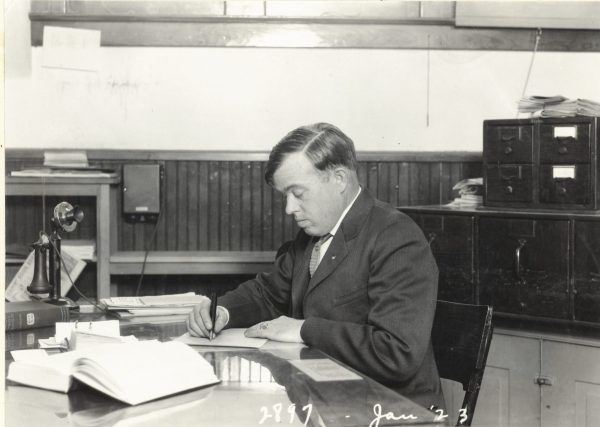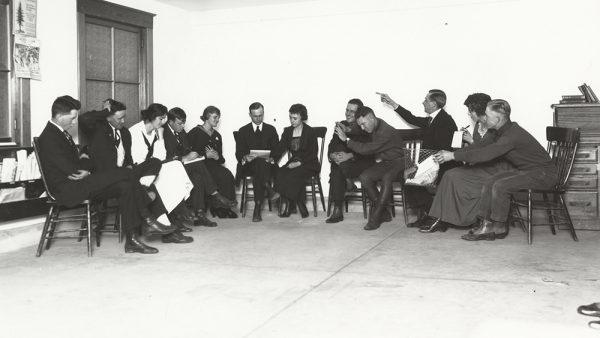English hit the 20-year mark as a standalone department in 1959. It was the year that Gigi won nine Academy Awards, besting Gone With the Wind’s record eight; that Lorraine Hansberry’s play A Raisin in the Sun opened on Broadway, and that Miles Davis released the groundbreaking jazz album Kind of Blue. Alaska and Hawaii became states, and NASA announced the “Mercury Seven,” the group of military pilots who had “the right stuff” to become the first US astronauts.
D.H. Lawrence’s Lady Chatterly’s Lover was allowed in the US after a successful court case overturned a 31-year obscenity ban. Kurt Vonnegut’s The Sirens of Titan, William Burrough’s Naked Lunch, and Phillip Roth’s Goodbye Columbus were published. Stanley Kunitz’s Selected Poems: 1928-1958 won the Pulitzer Prize for poetry.

As the decade closed, Colorado State University was nearing the 6,000-student enrollment mark, and the English Department had lost two long-serving professors—Alfred Westfall in 1953 and Clarence Wentworth in 1958. Both men left a legacy that endures.
Westfall began his service to what became CSU in 1913. He not only taught English throughout his career, but served as department chair from 1926-1953. Westfall also was deeply engaged in student extracurricular activities. In 1915, he organized the Scribbler’s Club. He was the first coach of the boxing team formed in 1919. He also led debate teams, including the first men’s team to join intercollegiate competition. In 1922, his team travelled cross-country by train, winning 12 of 14 competitions. In 1924, he took a women’s debate team on a major tour as well.

Upon his death, the English department established the Alfred R. Westfall Scholarship Memorial Fund. In her letter soliciting contributions, his colleague R.J. Wattles said that Westfall “labored for and loved all the college students.” She wrote that
“He returned on the day of his death from a long and tiring trip to a speech convention at which be had represented A & M and at which his forthcoming retirement had been celebrated. Tired as he must have been on his return, he went to his office and resumed his duties as head of the Department of English and Modern Languages. His last official act was to compile a list of his senior English majors in order that they might be invited to his home for dinner before their graduation.”
The Westfall scholarship continues to be funded by faculty, friends, family, and alumni and to provide support “for students who have demonstrated superior achievements or skills, thereby encouraging their continued efforts and the overall atmosphere of vigorous research and creativity,” according to the CLA scholarship site. Westfall’s son Ralph is an active participant in the scholarship at age 101. The university honored Westfall as well, naming a newly-constructed residence hall for him —one of the towers—in 1968.
In 1958, the department lost Clarence Wentworth, who joined the English faculty in the fall of 1946. In the introduction to Exile from Eden, a book of his poems published posthumously by some of his colleagues, his good friend and office mate Glenn Matott remembered him fondly as “wit and originator of anecdotes; bibliophile and voracious reader; gourmet and gourmand; eccentric and sanest of men.” Matott spent time with Wentworth during his final days and recalled that
“It was discovered after he was dead that on a page of heavy paper which seemed to have been torn from a book, he had written a single sentence assigning his estate, consisting of some stocks and cash, to the English Department of Colorado State University to be used for ‘the purchase of books.’”
Wentworth’s gift endures. Since 1988, the Wentworth Memorial Endowment has purchased books and materials for Morgan Library, directed by the English Department. In recent years, the endowment has funded large, expensive databases available to CSU affiliates via the library web site, including this writer’s favorite—the Oxford English Dictionary. Other databases currently supported by the Wentworth fund include the following:
- Early American Imprints: Evans 1639-1800 (purchased by Irene Bostrom Endowment)
- Early American Imprints: Supplement, 1670-1800 (purchased by Irene Bostrom Endowment & Wentworth)
- Independent Voices (alternative press materials)
- Iter Bibliography (secondary source materials on Middle Ages & Renaissance time period 400-1700)
- Literary Research Guide: An Annotated Listing of Reference Sources in English Literary Studies (Harner)
- Women Writers Online 1526-1850 non-fiction, verse, drama, fiction, prose
- World Shakespeare Bibliography Online 1960- all important materials related to Shakespeare, annotated